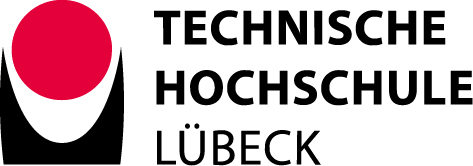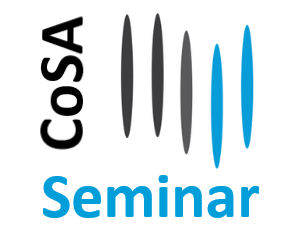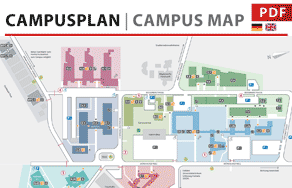The CoSA seminar will be held on February, 26th 2024 at 11:45am hybrid in room 1-1.03 and via BBB (https://bbb.th-luebeck.de/rooms/bar-pz2-gjn-3kh/join).
We have planned the following presentations:
- Bram Bock: Enhancing Maritime Autonomy: Leveraging 5G to Realize the Digital Twin Vision in the DAVE Project
- Lukas Selent: Deployment and Evaluation of an SDR-based 5G Amplify and Forward Relay Node Concept
- Thilo Steinbock: Evaluation on the capabilities of MATLAB Simulink's Embedded Coder for rapid prototyping of micro-controller based control systems for switching converters
- Marcel Scheel: Advanced 3D spatial mapping in ROS2 with radar integration
- Joschua Schäfer: A Comparative Study of 180° SLAM Scanning with a Collaborative Robot Arm
- Tyll Jungke: Emulation of an automotive control module to operate diagnostic equipment without physical vehicle
- Tobias Wörthmüller: Application of Polarimetry for Estimating Surface Normals and Depth Reconstruction of Geometrically Defined Objects
The presentations will last approximately 10 minutes followed by 2 minutes of discussion. We look forward to a lively and active participation.
The seminars can also be found at https://www.th-luebeck.de/cosa/. If you would like to offer a talk as well, please feel free to contact us (fabian.john(at)th-luebeck.de).
Bram Bock: Enhancing Maritime Autonomy: Leveraging 5G to Realize the Digital Twin Vision in the DAVE Project
The integration of 5G technology into the DAVE project is a key step towards revolutionizing autonomous navigation for cargo ships. Motivated by the project’s visionary goal of creating a digital twin for vessels, this paper explores the critical role of 5G in enabling real-time data transfer from on-board sensors to a central data repository on shore. The infrastructure, using Jetson Orin and Nano, a sensor platform, and 5G modems, ensures seamless connectivity and high-speed data transfer. Through extensive measurements using iPerf, we compare Ethernet, WLAN 2.4GHz and 5G, and show that 5G networks exceed the required throughput, making them a robust choice for the DAVE project. The integration of 5G not only increases data throughput, but also enables the project to make data-based decisions in real time, contributing to safer and more efficient autonomous ship navigation. This research assists the beginning of a new era of maritime autonomy.
Lukas Selent: Deployment and Evaluation of an SDR-based 5G Amplify and Forward Relay Node Concept
To enhance the effective implementation and operational performance of standalone 5G networks in complex indoor environments, it is essential to incorporate relay nodes. These nodes play a crucial role in ensuring comprehensive coverage within the designated area. There are different types of relaying protocols, with the main groups being Amplify-Forward and Decode-Forward systems. In pursuit of an inexpensive and adaptable coverage paradigm, by keeping it in a simple manner this work focuses on using an AF relay node design. Addressing the existing challenges associated with the cost-effectiveness and flexibility of such systems, this work contributes by presenting and testing an solution approach based on a rudimentary software defined radio and Ettus Research’s UHD Python API. Showing the problems that came up by using simple hardware and the simplicity of the relay node design which consisted of receiving a 5G signal, processing and transmitting the processed data, amplifying it by an dynamic transmitter gain control.
Thilo Steinbock: Evaluation on the capabilities of MATLAB Simulink's Embedded Coder for rapid prototyping of micro-controller based control systems for switching converters
Switching converters play a crucial role in modern power electronics, offering efficient voltage conversion in various electronic devices. This paper presents an approach to the rapid prototyping for micro-controller based control systems, applied to the buck-converter topology. The methodology utilized features from MATLAB Simulink and it’s Embedded Coder extension to model and implement the control system, enabling a simplified transition from simulation to hardware implementation. For this purpose the paper evaluates two control systems, namely the error-amplifier and the PID controller. Comparative analysis reveals insights on the startup behavior, RMS voltage, peak-to-peak voltage and maximum voltage. While the simulation outperformed the measurements of the hardware implementation, this paper still underscores the utility of MATLAB Simulink’s Embedded Coder for rapid prototyping and hardware-in-the-loop development of switching converter control systems.
Marcel Scheel: Advanced 3D spatial mapping in ROS2 with radar integration
In this paper, a 3D spatial mapping system is implemented using the Texas Instruments IWR6843AOP radar sensor in ROS2. This represents a further development that uses real odometry data for orientation. A radar sensor was chosen to overcome the limitations of traditional LIDAR systems in terms of their sensitivity to environmental infl uences such as sunlight. This enables more robust measurements in different environments. ROS2 is used for implementation to enhance modularity and real-time capabilities, ensuring more reliable data creation and precise sensor orientation. The Octomap framework is used to create the 3D map. This framework offers efficient data processing through octrees to create detailed 3D maps. The actual map creation is done by processing the Point Clouds from the radar data combined with the odometry data, which are published in ROS2 Topics. The entire System is implemented on the Latte Panda 3 Delta and provides the basis for efficient 3D mapping.
Joschua Schäfer: A Comparative Study of 180° SLAM Scanning with a Collaborative Robot Arm
As digitization progresses, the signifi cance of data becomes ever greater. Simultaneously, there are increasingly efficient and accurate methods for gathering information. Simultaneous localization and mapping (SLAM) is one way to capture spatial data. The aim of this paper is to explore the potential of SLAM with a Depth Camera and a collaborative robot. This is to clarify the possible applications and susceptibility to parameters and external influences. Three variables are considered below. A total of 16 tests are carried out to determine the influence of the robot’s rotational speed, the available computing power and the lighting. During this time, log messages providing information about the quality of odometry are saved in separate text files. The evaluation shows that lower computing power leads to the output of fewer values and more warnings. Poor illumination of the test area leads to overall lower values. The analysis of the median reveals no new insights. The quality values can move both upwards and downwards. In most cases, the odometry recovers after reaching the value zero. In conclusion, the obtained results can be helpful for future work with this system.
Tyll Jungke: Emulation of an automotive control module to operate diagnostic equipment without physical vehicle
For modern road cars it becomes less feasible for the owners to conduct repairs themself. One reason for this is that equipment required for diagnosing and re-calibrating electronic control modules is not widely available. This work evaluates whether such equipment can be built without documentation by the manufacturer. To achieve this, an emulator is written in an attempt to replicate the diagnostic interface of an 2015 Ford Focus powertrain control module. The emulator is then tested against a commercial scan tool to validate whether diagnostic operations can be performed. This work shows that a commercial diagnostic tool can be operated using this emulator.
Tobias Wörthmüller: Application of Polarimetry for Estimating Surface Normals and Depth Reconstruction of Geometrically Defined Objects
This paper presents a comprehensive study on the utilization of polarimetry for the estimation of surface normals and the subsequent reconstruction of depth information for objects with geometrically defined shapes. Polarimetric imaging, which captures the polarization state of light reflected from surfaces, provides unique insights into surface properties and orientations that conventional imaging techniques cannot. By analyzing the angle of linear polarization (AoLP) across different polarization states, we can infer the orientation of surface normals.


